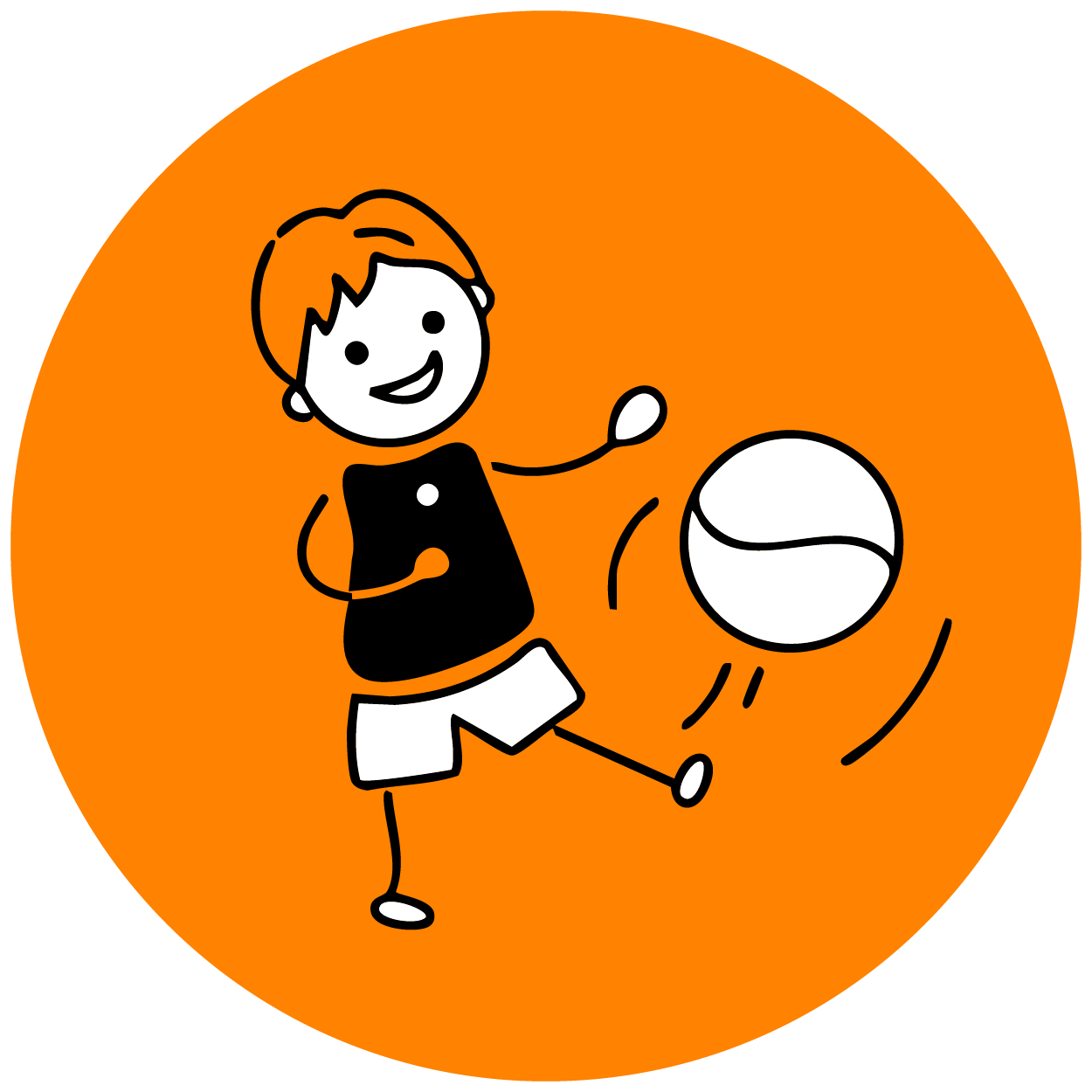
Physical
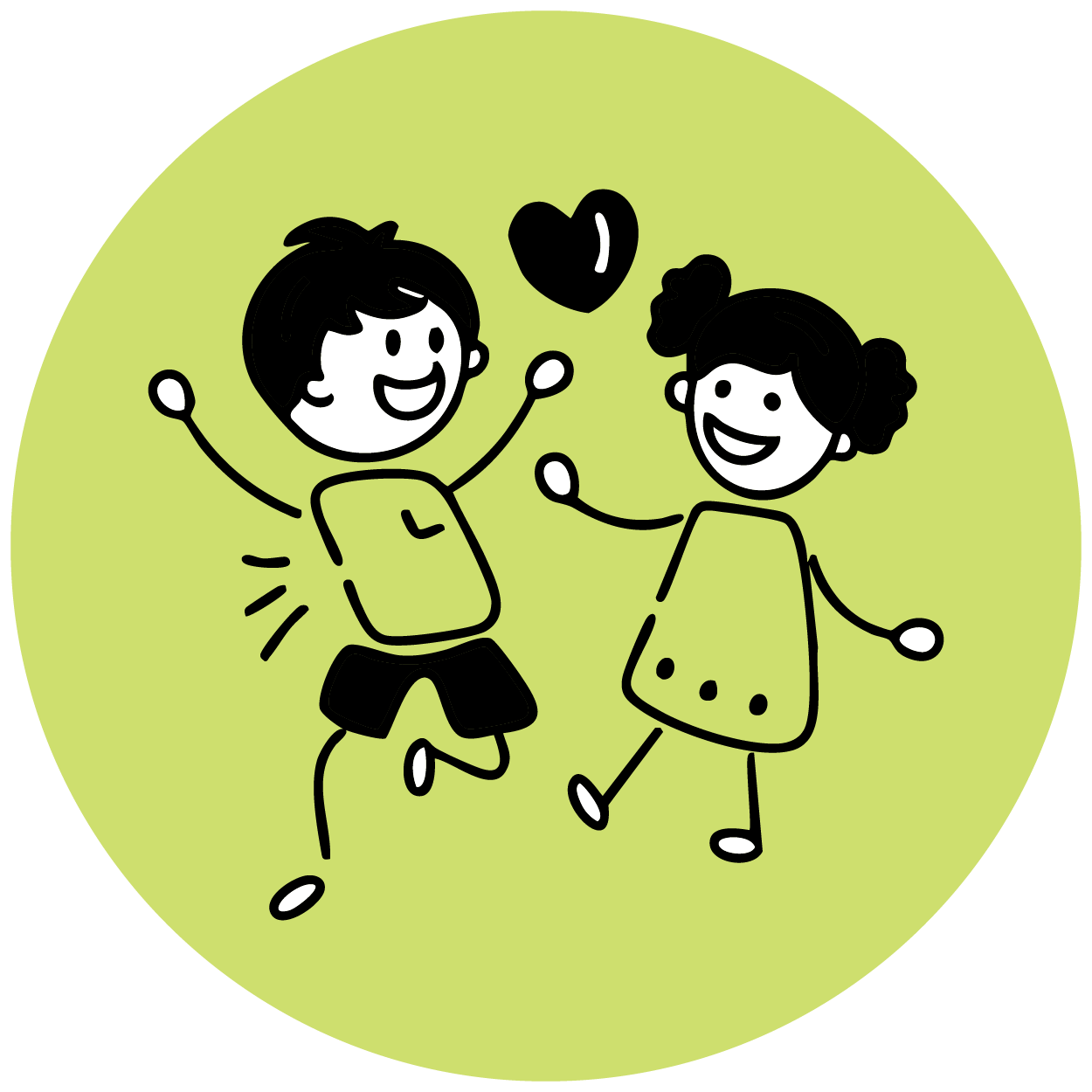
Social & Emotional
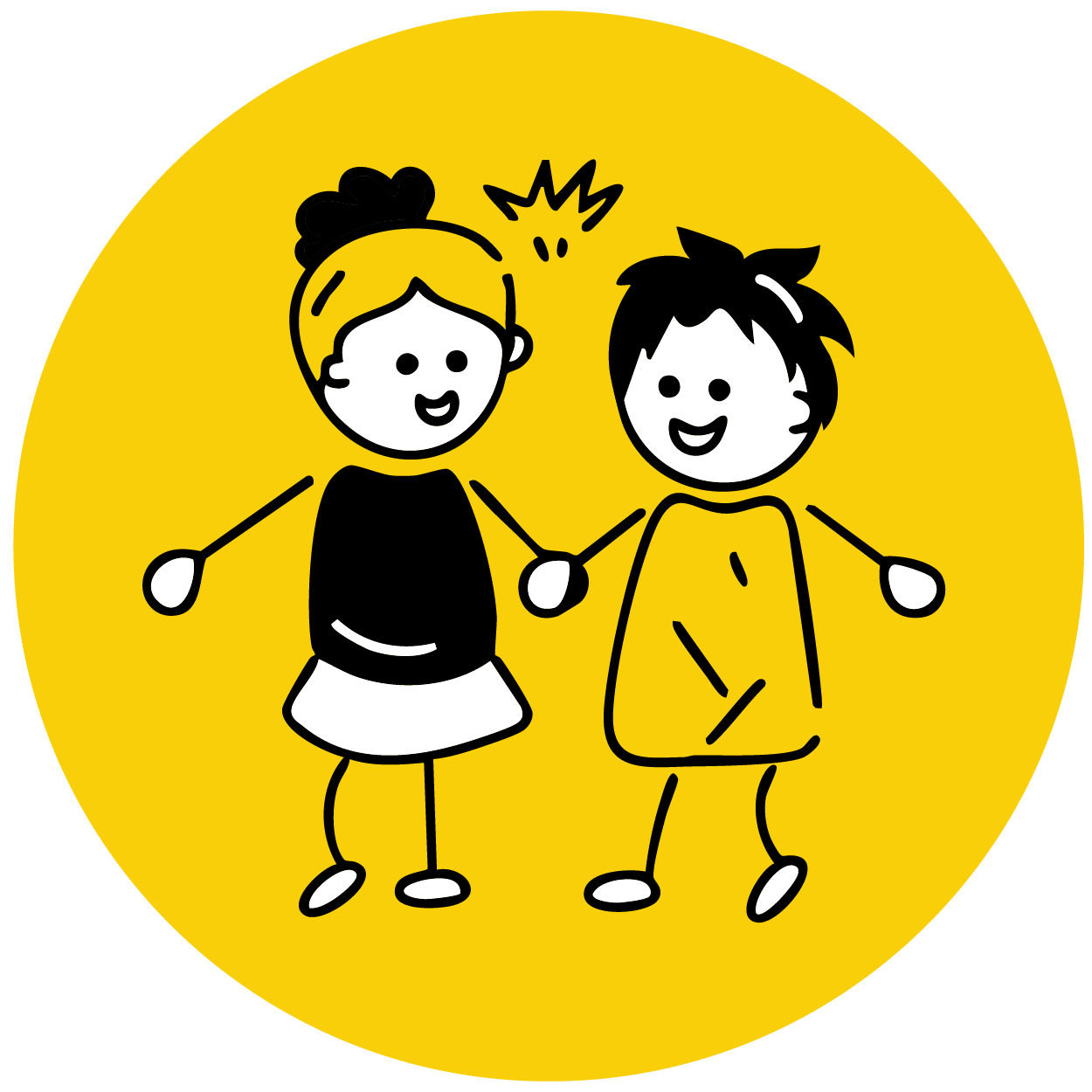
Language
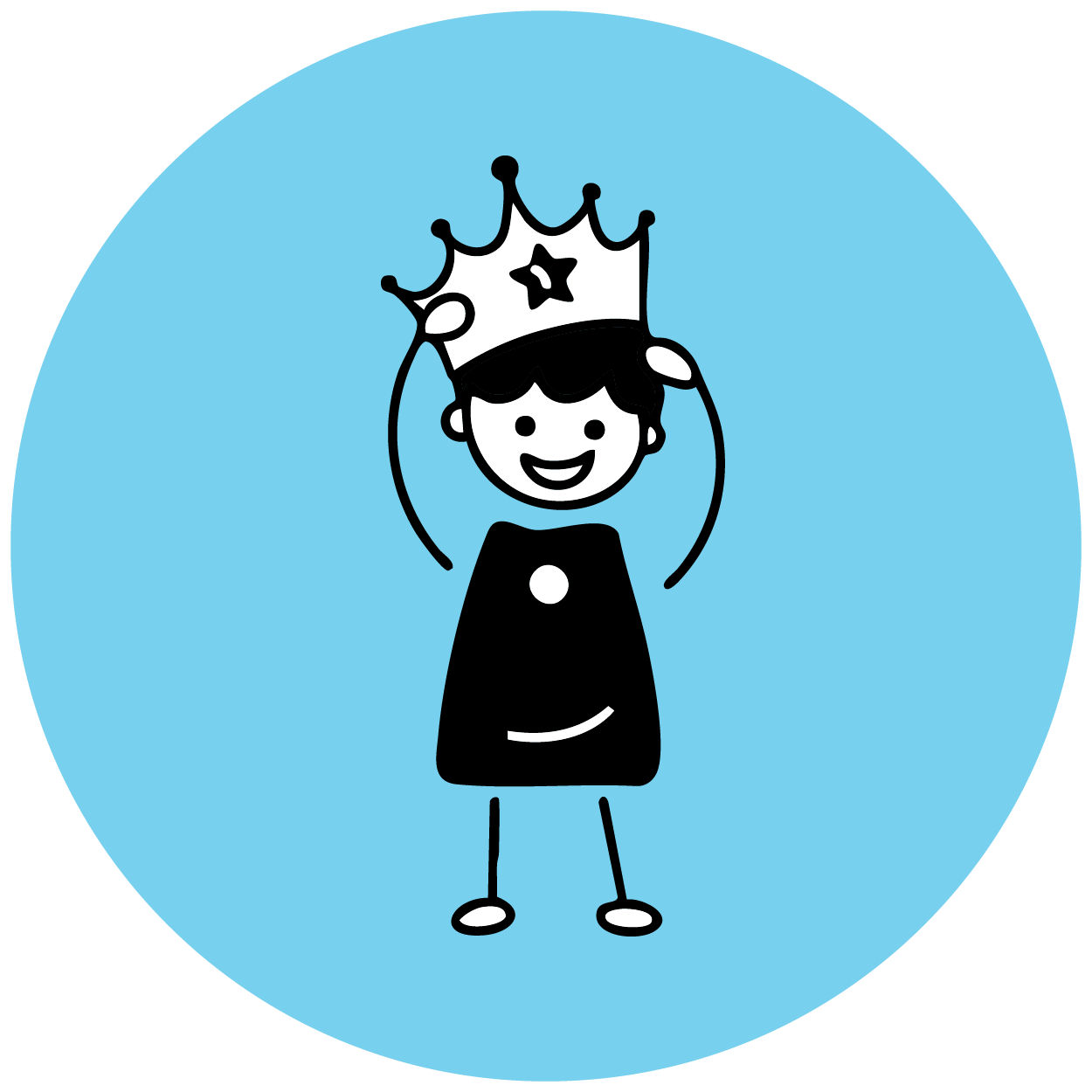
Intellectual

Play is a child’s first and most powerful way to learn.
The earlier caregivers understand child development, the better they can shape a child’s first learning experiences. During the first five formative years — when the brain grows fastest — children benefit most from thoughtful, guided play and a caring adult who supports exploration.
At Curio Cubs we design toys and play experiences that respect these early stages of development: sensory-rich, screen-free, and open-ended. Our handcrafted neem-wood toys are made by skilled artisans and encourage curiosity, motor skills, language, and imagination — all while being gentle on the planet.
How play helps at different ages

0–12 months
Sensory exploration, cause-and-effect, and secure attachment. (Rattles, simple wobblers, and texture-rich toys.)
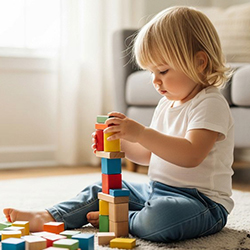
1–3 years
Gross and fine motor practice, early language, and problem-solving. (Stacking, sorting, and color-match toys like our Boat set.)
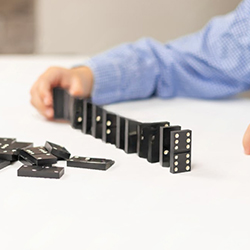
3–6 years
Storytelling, role-play, social skills, and early reasoning. (Pretend-play sets, family miniatures, and simple puzzles like the Joker Puzzle.)
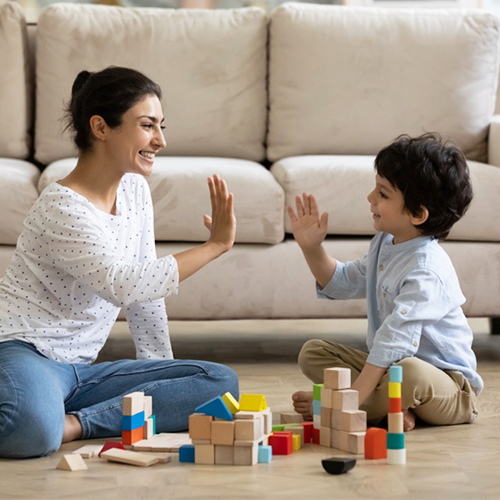
Why Curio Cubs helps
- Screen-free, open-ended play that encourages creativity and longer attention spans.
- Neem wood & natural materials — durable, safe, and naturally saliva-resistant.
- Handcrafted by artisans (Banaras) for tactile quality and lasting value.
- Designed for development — each toy targets sensory, motor, social, or cognitive milestones.
- Sustainable play — made to be passed down and to reduce plastic use.
Little hands learn best by doing. With Curio Cubs, play becomes a joyful classroom — one that grows with your child.
Physical
Fine Motor | Gross Motor | Coordination Visul | Auditory | Tactile | Physical
Play provides opportunities for children to engage in physical activities that promote gross and fine motor skills. Whether it's running, jumping, climbing, or manipulating objects, active play helps children develop coordination, strength, and agility. Activities like building with blocks, drawing, or playing with puzzles also enhance hand-eye coordination and fine motor control.
Social & Emotional
Fine Motor | Gross Motor | Coordination Visul | Auditory | Tactile | Physical
Play provides opportunities for children to engage in physical activities that promote gross and fine motor skills. Whether it's running, jumping, climbing, or manipulating objects, active play helps children develop coordination, strength, and agility. Activities like building with blocks, drawing, or playing with puzzles also enhance hand-eye coordination and fine motor control.
Language
Language & Communication | Sign Language | Pre Braill
Play encourages creativity and imagination as children engage in open-ended, imaginative activities. Whether it's building with blocks, creating artwork, or inventing pretend scenarios, play allows children to explore their imagination, experiment with new ideas, and express their unique perspectives. This fosters divergent thinking, problem-solving skills, and a sense of wonder and curiosity.
Intellectual
Cause & Effect | Explore | Conectration | Creative | Memory | Logical | Mathematical | Problem Solving | Imagination
Play facilitates language development by providing opportunities for communication, storytelling, and vocabulary expansion. During pretend play, children engage in dialogue, negotiate roles, and express their thoughts and feelings. They also learn to use language to describe their actions, make requests, and convey ideas, which strengthens their linguistic abilities.
Choose Your Child Age
Child Development 0-6M (Curio Cubs)
In the first six months, babies learn through their senses. Gentle, safe, and thoughtfully designed play helps build the foundations for vision, movement, language and curiosity. Curio Cubs toys are crafted to support these milestones — sensory-rich, screen-free, and safe for little hands and mouths.
Visual stimulation
Encourage visual tracking and focus with high-contrast mobiles, hanging toys and bright, simple patterns. Hold small objects or soft floating books at different distances so your baby practices following and focusing.
Motor stimulation (gross & fine)
Support early movement and hand control with a baby gym, soft wobblers, and lightweight rattles. Tummy time with textured mats and reachable toys helps strengthen neck, shoulder and arm muscles.
Auditory stimulation
Soothe and engage with gentle sounds — music boxes, soft rattles, or singing. Repetitive, playful noises help babies learn cause-and-effect and begin to recognise voices and rhythms.
Tactile stimulation
Offer safe textures for touching and mouthing to build understanding of temperature, weight and texture. Think soft fabric toys, neem-wood rattles with smooth finishes, and textured sensory tags.
Intellectual & social stimulation
Talk, sing, and narrate what you’re doing. Use photo books, floating baby books with vivid images, and unbreakable safety mirrors to introduce faces, objects and simple stories. These interactions strengthen bonding and early cognition.
Simple caregiver tips
- Follow your baby’s lead — short, frequent play moments work best.
- Keep objects safe, chewable, and easy to grasp.
- Make play multisensory: combine sight, sound, touch and motion.
- Repeat songs, faces and games — repetition builds learning.
Curio Cubs designs each piece to invite curiosity and support these first discoveries — hand-crafted, durable, and made for little explorers.
Child Development - 6M+
From 6 months onward babies move from simple sensory discoveries to active exploring, experimenting, and social play. Curio Cubs toys are crafted to support these leaps — durable neem wood, safe finishes, and open-ended designs that invite independent play and grown-up interaction.
Tactile — Touching & Holding
Encourage exploration of different surfaces and weights with sensory tumblers, teethers, and gummy rings. Rotating, stacking, and textured surfaces help build hand awareness and oral-motor confidence.
Gross motor — Muscle & Balance
Support rolling, sitting, crawling and early standing with gentle push-toys, rollers and low walkers. These activities strengthen core, leg and shoulder muscles and develop balance.
Fine motor — Hand-eye Coordination
Use clutching toys, soft balls, and peg-style pieces to practise grasp, release and targeted reaching. Simple stacking and inserting activities sharpen pincer grasp and coordination.
Social & Emotional
One-on-one play, peek-a-boo, and small group activities help babies learn turn-taking, secure attachment and early social cues. Use baby mirrors, puppet play, or family miniatures to encourage smiles, shared attention and imitation.
Creative & Imaginative
Introduce simple props (miniatures, bath toys, soft blocks) to spark pretend play. Water play with a Sea Life Bath set or stacking cups builds cause-and-effect thinking and playful storytelling.
Language & Communication
Narrate play, name objects, and read picture books (mirror baby books are great). Encourage babbling by pausing and giving the baby time to respond — repetition and simple questions build early vocabulary.
Independent Exploration
Create short, supervised free-play sessions with a curated set of 3–5 safe toys. Rotate toys weekly to keep novelty and support focused attention.
Caregiver tips (quick)
- Keep play short and frequent; follow the baby’s interest.
- Combine sensory inputs: talk while offering a textured toy, sing during bath time.
- Choose screen-free, natural materials that are chew-safe and easy to clean.
- Rotate toys to re-spark curiosity and track new skills.
Why Curio Cubs helps
- Handcrafted neem-wood and textiles: natural, durable, and safe for mouthing.
- Screen-free, open-ended designs that grow with your child.
- Intentionally small toy sets that encourage focused play and caregiver interaction.
- Built to be passed down — sustainable design for mindful parenting.
Child Development - 12M+
At around 12 months little explorers move fast — physically, socially and mentally. Curio Cubs toys are designed to meet these new leaps: active, hands-on, and full of pretend possibilities that encourage independence, problem-solving and joyful discovery.
Gross motor & listening development
Strengthen balance, coordination and walking confidence with push-and-pull toys and ride-along pieces that invite movement and cause-and-effect play.
Fine motor & hand-eye coordination
Practice precision and control with hammering and pounding toys like the Pounding Bench and Hammering Balls — perfect for grasp, aim and timed release.
Auditory & rhythm
Build sound discrimination and a sense of rhythm with musical toys such as the Fish Castanet — tapping, shaking and clapping help children notice patterns in sound.
Visual & perceptual skills
Boost attention and visual discrimination with bright, contrasting shapes and pattern games. Stacking, nesting and matching activities help the eye-hand connection.
Social & emotional
Small-group play, turn-taking games and pretend scenarios support sharing, empathy and confidence. Toys that invite role-play help children practise feelings and interactions.
Mathematical & intellectual skills
Introduce early math concepts — size, order, color and quantity — with stacking sets, the Owl Sorter and Nesting Boxes. Sorting and sequencing build logic and classification skills.
Imagination & creativity
Encourage storytelling and open-ended play with My First Phone, The Dino Car and other props that let children invent characters, actions and mini-adventures.
Quick caregiver tips
- Offer short, supervised play sessions that follow your child’s interest.
- Combine movement + language: narrate pushes, counts and actions as they play.
- Rotate 4–6 toys weekly to keep play fresh and focused.
- Keep materials natural and chew-safe — Curio Cubs uses neem wood and non-toxic finishes for lasting, safe play.
Why Curio Cubs works
Handcrafted, screen-free toys that grow with your child — designed to strengthen motor, social, language and early math skills while being durable, natural and made to be loved (and passed down).
Child Development - 18M+
From 18 months, children get steadier, more curious and delightfully experimental. Curio Cubs toys are built to support this stage with open-ended, durable pieces that encourage independent play, social moments and early thinking skills.
Fine motor & coordination
Practice precise hand movements and eye–hand control with wooden blocks, small sorting pieces, and pretend-play food sets (cutting fruit & vegetables). Activities that require picking up, placing and manipulating strengthen pincer grip and dexterity.
Emotional & creative play
Spark imaginative, emotionally rich play with musical toys like the Solid Drum and Concertino. Music, rhythm and role-play help children express feelings and build confidence.
Mathematical & intellectual skills
Introduce counting, comparing and ordering with Stacking Rings, Sort & Count Cups, and Sorting Puzzles. These toys build early number sense, pattern recognition and basic classification skills.
Logical thinking & problem solving
Offer simple challenges—stacking, nested puzzles, and cause-and-effect toys—to help children plan actions, test solutions, and learn persistence when things don’t work the first time.
Language & communication
Encourage naming, describing and storytelling with props like My First Camera or picture cards. Ask simple questions, pause for responses, and expand children’s words into short sentences to grow vocabulary and conversational skills.
Quick caregiver tips
- Create short, focused play sessions with 3–5 rotated toys.
- Narrate actions (“Now you put the red ring on!”) and count aloud during play.
- Follow your child’s interest—let them lead and offer gentle challenges.
- Combine music + movement to reinforce memory and mood.
Why Curio Cubs helps
Handcrafted, screen-free toys made from natural materials that grow with your child—designed to boost fine motor control, early reasoning, language and emotional confidence while staying safe and sustainable.
Child Development - 2yrs+
At 2 years and beyond, children become bolder movers, sharper thinkers and enthusiastic pretend-players. Curio Cubs toys are designed to match this stage — active, open-ended and thoughtfully sized to challenge little hands and big imaginations.
Gross & fine motor skills
- Build strength, balance and coordination with active toys such as the Rocking Horse and Deliver Bike.
- Refine hand control and precision using puzzles, threading and construction play like Geo Lacing Beads and Twisted Blocks.
Coordination, visual & concentration
- Combine eye–hand tasks (lacing, stacking, peg boards) to sharpen coordination and visual discrimination.
- Short, focused play sessions with one engaging toy at a time help lengthen attention spans.
Problem solving, cause & effect, logical thinking
- Encourage trial-and-error learning with mechanical and sorting toys: Geometric Sorting Board, Geometric Peg Board, Shape Sorter, Gears & Puzzles-Deluxe, and Jumping Acrobat. These teach sequencing, prediction and persistence.
Mathematical & intellectual skills
- Introduce early counting, sizes and patterns using Nesting Boxes, Number sets, and basic sorting activities. Simple matching and sequencing lay the groundwork for number sense.
Imagination & creative play
- Fuel storytelling and role play with pretend sets like the Kitchen Set or Breakfast and character builders. Alphabet A–Z and Numbers 1–10 playsets turn learning into make-believe.
Social & emotional development
- Use cooperative games and props (Mood Memo, Build-a-Robot) to practise sharing, empathy and talking about feelings. Role play helps children label emotions and try out different social responses.
Language & communication
- Expand vocabulary through play: name pieces, describe actions, count aloud and invite your child to narrate their play. Ask open questions (“What will the robot do next?”) to encourage longer responses.
Quick caregiver tips
- Rotate 4–6 toys weekly to keep novelty and focus.
- Offer gentle challenges—not frustration: make tasks slightly harder than current skill level.
- Combine movement + talk: narrate while your child climbs, builds or sorts.
- Keep play screen-free and made from safe, natural materials.
Why Curio Cubs helps
Handcrafted, durable, screen-free toys designed to grow with your child — encouraging motor skills, early math, creativity, concentration and emotional awareness while staying safe and sustainable.
Would you like a short product-page blurb or a 2-line Instagram caption using this copy?
Child Development - 3yrs+
At 3+, children get bolder, wilder in play, and sharper in thinking. Curio Cubs toys support this stage with active, hands-on, and imaginative pieces that build coordination, memory, language and social skills — all screen-free and made from natural materials.
Fine & gross motor / coordination
- Advance mobility and balance with outdoor and active playsets like Mini Golf and Meadow Ring Toss.
- Sharpen hand-eye control and bilateral coordination through independent play with games such as Tie-Up Shoeand construction activities.
Visual perception, memory & concentration
- Strengthen visual discrimination and short-term memory with matching, pattern and sequencing games. Use tactile memory pieces like Tactile Stones to practise remembering shapes and placements.
- Short, focused challenges (matching or sequence runs) boost attention span.
Social & emotional development
- Encourage emotional expression, turn-taking and cooperative play with role-play sets like the Doctor Set and Fantasy Blocks. Role play helps children name feelings, practise empathy and manage small conflicts.
Problem solving, logic & mathematics
- Introduce multi-step tasks and simple puzzles to teach planning and logical thinking. Sorting, basic counting games, and pattern building lay foundations for math reasoning.
Imagination & creative play
- Encourage storymaking and open-ended scenarios — kitchens, pretend shops, outdoor adventures and costume play let children invent characters, sequences and solutions.
Language & communication
- Expand vocabulary and narrative skills by telling stories about play (“Why is the doctor checking the bear?”), asking open questions and encouraging children to describe steps and choices.
Quick caregiver tips
- Offer 20–30 minute play sessions that follow the child’s lead.
- Give toys small challenges — not frustration — to encourage persistence.
- Rotate themed playsets weekly to keep novelty and storytelling fresh.
- Praise effort and talk through problem-solving steps aloud.
Why Curio Cubs helps
Handcrafted, durable, screen-free toys designed to grow with your child — promoting coordination, memory, logic, creativity and social skills while being safe and sustainable.
Child Development - 5yrs+
At 5+ years, children become confident planners, storytellers and collaborators. Play shifts toward longer, rule-based games, richer narratives, and projects that require planning, negotiation and sustained attention. Curio Cubs toys encourage all of this with open-ended sets that promote social skills, executive function, creativity and early academic thinking.
Key developmental areas & toy suggestions
- Gross motor & coordination — active outdoor games, balance boards, and ride toys for stamina and body awareness.
- Fine motor & precision — construction kits, detailed model sets and lacing activities that refine dexterity.
- Visual & spatial skills — map puzzles, train set layouts, and airport set play that build spatial planning and visual sequencing.
- Social & emotional — family set, role-play sets (Airport, Train, Doctor, Kitchen) that encourage turn-taking, perspective-taking and cooperative story-building.
- Imagination & creativity — open-ended play with the Airport Set (check-in, control tower, luggage), Train Set (routes, stations, cargo), and Family Set (characters, household scenes) to invent scenarios, jobs and plots.
- Mathematical & logical thinking — board games, route-planning with trains/airports, money-play in pretend shops, and building projects that teach counting, measurement and sequencing.
- Problem solving & executive function — multi-step projects (build-a-route, timed challenges, team missions) that require planning, adapting and task-shifting.
- Memory & concentration — longer board games, story-relay activities and multi-piece sets that require remembering rules, sequences and roles.
- Language & communication — storytelling, script-play, negotiations and role-assignment during group play grow vocabulary, narrative structure and persuasive language.
How specific Curio Cubs sets support growth
- Airport Set: Teaches sequencing (check-in → security → boarding), role-play (pilot, ground staff), and spatial planning (runways, gates). Great for collaborative storytelling and early civics (jobs, travel).
- Train Set: Builds planning and cause-effect (track layouts, switches), early engineering (bridges, gradients) and cooperative play as kids design routes and schedules.
- Family Set: Encourages emotional language, social roles and household routines—perfect for practising empathy, conversation and shared problem-solving.
Caregiver tips (quick & practical)
- Turn play into a project: set a theme (e.g., “Build the city”) and let children plan, assign roles, and execute over several sessions.
- Encourage rule-making: ask kids to invent one new rule for a game each time they play.
- Use open questions: “How will the train reach the airport?” or “What happens if the luggage is late?” to prompt reasoning.
- Mix solo and group play: both build different skills—independence and collaboration.
- Rotate challenge levels: add constraints (time limits, resource limits) to boost planning and flexible thinking.
Why Curio Cubs helps at 5+
Our handcrafted, screen-free, durable sets are designed for multi-session play, social interaction and imaginative storytelling—built to grow from solo builders to group storytellers and young planners.
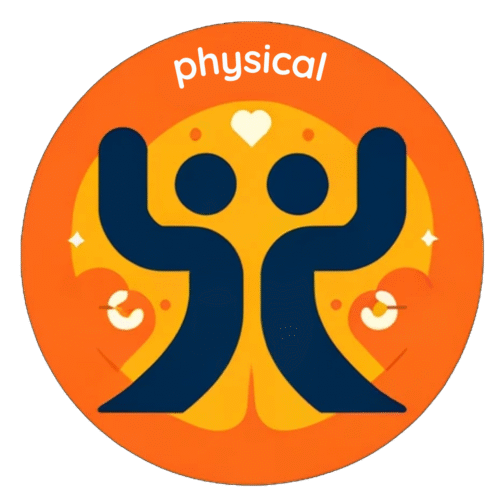
Physical
Fine Motor | Gross Motor | Coordination Visul | Auditory | Tactile | Physical
Play provides opportunities for children to engage in physical activities that promote gross and fine motor skills. Whether it's running, jumping, climbing, or manipulating objects, active play helps children develop coordination, strength, and agility. Activities like building with blocks, drawing, or playing with puzzles also enhance hand-eye coordination and fine motor control.
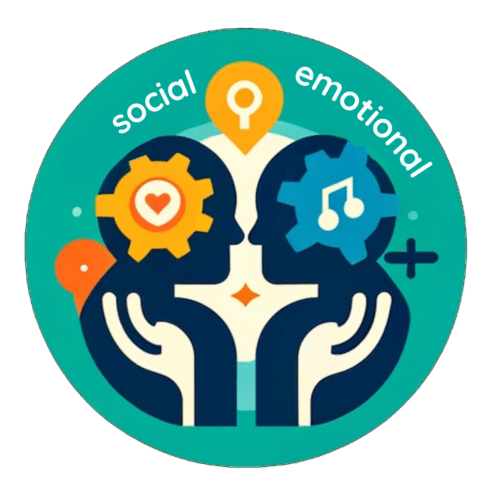
Social & Emotional
Emotion | Musical | Social | Theory of Mind
Play is a social activity and serves as a platform for emotional expressionand regulation. that allows children to interact with peers, negotiate roles, and practice social skills such as cooperation, communication, and empathy. In play settings, children learn to take turns, share resources, resolve conflicts, and collaborate on tasks. Through pretend play, children can explore and process their feelings, fears, and fantasies in a safe and supportive environment. Play also helps children develop empathy and perspective-taking as they take on different roles and consider others' thoughts and feelings. Additionally, play can boost self-esteem and confidence as children master new skills and overcome challenges.
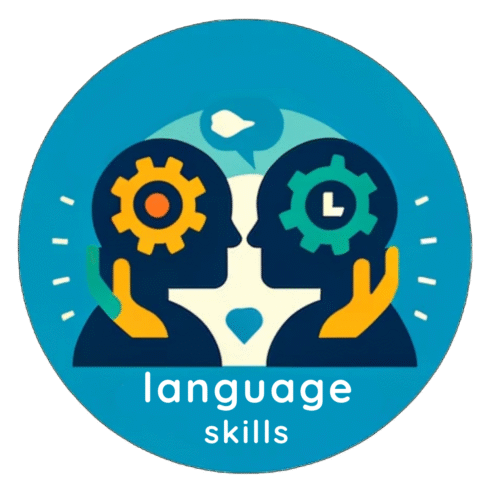
Language
Language & Communication | Sign Language | Pre Braill
Play encourages creativity and imagination as children engage in open-ended, imaginative activities. Whether it's building with blocks, creating artwork, or inventing pretend scenarios, play allows children to explore their imagination, experiment with new ideas, and express their unique perspectives. This fosters divergent thinking, problem-solving skills, and a sense of wonder and curiosity.
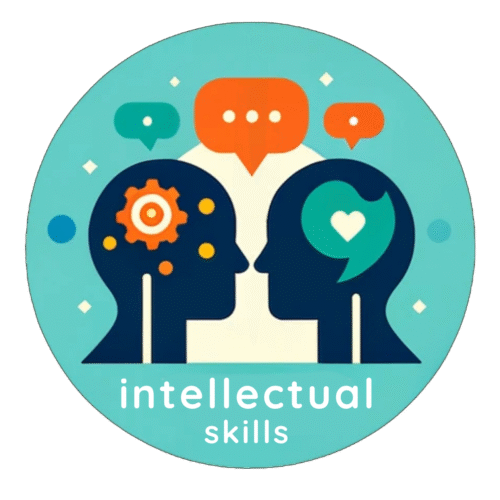
Intellectual
Cause & Effect | Explore | Conectration | Creative | Memory | Logical | Mathematical | Problem Solving | Imagination
Play facilitates language development by providing opportunities for communication, storytelling, and vocabulary expansion. During pretend play, children engage in dialogue, negotiate roles, and express their thoughts and feelings. They also learn to use language to describe their actions, make requests, and convey ideas, which strengthens their linguistic abilities.

